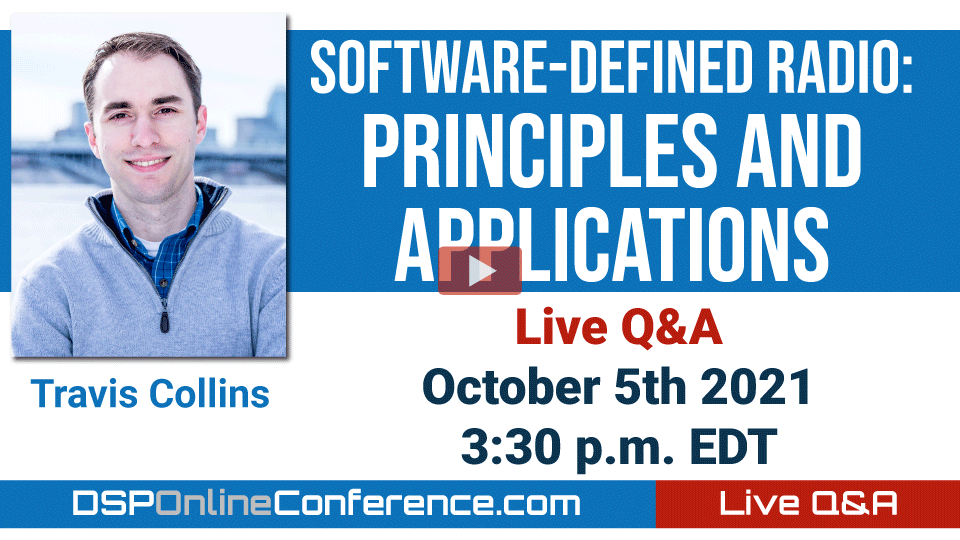Home >
Live Q&A with Travis Collins - Software-Defined Radio: Principles and Applications
Travis Collins - Watch Now - Duration: 28:17

The "Low IF" digital radio architectures do not suffer from IQ imbalance and DC offset issues. Those issues apply only to "Zero IF" architectures.
Zero IF is the AD9361/AD9364 architecture that's why there was a discussion about this.
Question on slide 14 related to mixing in an FM radio - when I move the dial to change my station, is that adjusting the RF Filter, and is the local oscillator always constant?
Hello, thank you Travis for this lecture. I am interested how quadrature tracking, RF DC and BB DC corrections work in practice. Are those algorithms are implemented in analog or digital domain? If in digital domain is it done in FPGA or in CPU? Any guidance would be appreciated.
Cheers
Oh, yeah, and same as @napierm, I'd like the slides if you can put them out for download.
Thanks, Travis, I periodically heard about SDR's but never had the chance to look into what they were, and the little blurbs I read online, well I just had trouble understanding them. This was very clear, and the nuances to the different types - as well as connecting back to the history - was helpful.
Will you post your slides?
16:32:46 From mnapier : I don't see how to raise my hand, looking.... 16:33:10 From Michael Kirkhart : Nice to hear you talk again - I attended the GNU Radio conference about 2 weeks ago (on-line). 16:51:44 From Fred Harris : I have some papers on I-Q imbalance and DC cancelers as well as image reject canceling algorithms... 16:52:07 From Marcin Puchlik : Mr F. Harris, I would be interested 16:53:49 From Fred Harris : drop me an email fjharris@ucsd.edu will send them to you... 16:54:22 From Marcin Puchlik : Sure! Thank you so much, I am sending a mail asap :) 16:54:40 From Fred Harris : we all the imbalnces and toleranc effects of I-Q analog processing "Dirty RF" 16:54:55 From Fred Harris : spelling... 16:56:21 From Fred Harris : We call the imbalances and tolerances effects of I-Q analog processing ( including Image folding), "Dirty RF" 16:57:14 From Michael Kirkhart : I believe you are referring to the 5G FR2 bands. 16:58:01 From Michael Kirkhart : https://www.electronics-notes.com/articles/connectivity/5g-mobile-wireless-cellular/frequency-bands-channels-fr1-fr2.php




As a follow-up to this talk, here's a classic talk by Marc Ettus where he uses a GNU-Radio model to simulate various I/Q imbalances
https://youtu.be/PNMOwhEHE6w